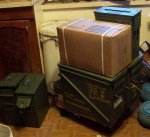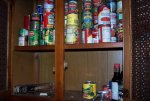I'd promised to show some of what I'm doing here about a food stash. This doesn't cover all, but shows the philosophy. I'm not of a mind to buy the high priced dehydrated stuff and keep it forever, mostly, my thinking along those lines is different, and perhaps differently motivated.
For one, thing, should I suddenly need a food stash, I know I won't want to totally upset my eating habits and feel like I'm downgrading, or exposing my body to such a sudden shift that it makes me slightly ill in doing it. If anything, I'll need to feel better than usual should I need it! To me, the stuff that keeps forever just doesn't satisfy that, costs too darn much, and is likely to get messed up in deep storage that I won't be paying much attention to.
So I have a different strategy - and at least one different reason to be doing this at all. Right now, food is a much better investment than say, SPY, so pulling demand ahead means I'm eating food at around 6 months ago prices. And thus, the stuff I stash is what I'd eat normally anyway.
Now, that might be a good bit different than most. I went all solar in '79 or so, and at first, couldn't have a refrigerator, or afford gas to the store (30mi round trip) all the time, so I had kind of an enforced boot camp in all this anyway, and got used to it. Like some in Detroit say, when it all goes down into a worldwide depression, we won't notice, we're in practice already.
I'm assuming you can go with a semi-oriental style - you have some things that are main calories, that are dirt cheap in bulk, then some lesser quantities of things that make it taste good enough to eat. In my case, those base things are rice, pasta, and wheat products (flour-bread).
Those store easily in old airtight ammo cans. I take say a 50 lb bag of rice, divvy it up into half full gallon freezer bags, and put it in the can. Ditto beans. I leave pasta in the box it came in (including mac and cheese). A neat trick - you can put a lump of dry ice in the bottom of the box, set on the lid, let it fill the box with CO2, displacing the air, then go ahead and clamp down the lid. This works pretty well for almost everything, though I've not found anything that can keep corn meal from going buggy - leave that out, or experiment with it in another box. I've also toyed with putting a fitting and valve on a couple of the larger boxes, which I can connect to a vacuum pump, remove the air and water, then let in argon/CO2 welding gas mix. Both work, and since I have welders, for me the second one works nicely for the boxes I'm opening now and then. You do have to put in some box stiffeners/dividers so the vacuum doesn't implode the ammo box.
Most canned food lasts nearly forever, if not longer. And you can tell if it goes bad usually. This is a great way to store things like meat (not self-canned, the "pro" stuff). Doesn't take much of that over rice or pasta to feed a big crowd. And veggies are nice to have. It's important to remember all the other stuff you'd normally cook with, or figure out a way to do without it. Spices, sauces, salt, sugar - all those are real important. For some people tobacco is a good one and can be bartered. Some med supplies, the basic stuff goes in with the food kit - aspirin, vitamins, small bandages and the like. I also built a more-advanced 1rst and 2nd aid kit separately.
Most of the time you won't need too many calories if hunkered down, but you need fiber (those veggies) particularly if you're not eating as much. Keep that in mind. If you're going to be busting hump, and need the calories as a result, it's hard to beat MRE's. I like those enough that they rotate through the system and I've never found out how long they can last(!). Again, a little of that rich stuff converts a lot of cheap calories into a more edible meal when you're stretching things out.
So, here's some pix of the "ready to bolt" stash. In addition, there are some shelves full of self-canned garden produce - which is just normal if you're living the rural lifestyle, and more MRE's on their own pallet elsewhere. This is kind of the "good stuff, variety" pack.


Obviously, even a condo dweller such as DoChen can do it at this level, and it gives you some peace of mind well ahead of a similar amount of fiat cash (which you should also have a bit of).
Did I mention there's a cheap "saturday night special" in every box somewhere? Might be a nice place to have one just in case someone is too demanding about the content of a box. I suppose you should have a combo lock on these as an excuse to be the one closest to that...
Oh, the ammo boxes on the left have, duh, ammo in them. A few different kinds for the various guns I own; I have a LOT of guns, not for defense, but for competition and general fun, but they are obviously "dual use". Again, that's far from my ammo stash total - since I reload I tend to have a lot around, and a lot ready to reload and full supplies. I lucked out on some of that. Being known as the "uber gun guy" in the 'hood, when people die off, and leave their stuff to people, those people tend to give me any gun related stuff, like powder, bullets, dies, primers, brass. So I'm in an overstocked condition by any measure - not from paranoia, but from "hey, it was free!" I should probably either shoot a bunch of it up or file to pay the armory tax...hmm, which is more fun?
The key here to all this is that you rotate through it to keep it reasonably new and fresh (applies to ammo too). Just use some along with whatever fresh you're also eating, and when you see a good deal at the store, like "10 for the price of..", or "a case for xxx off", now you have a reason to go for it, and get a good deal. Saves money in the good times too! Which in my philosophy is the best way of all - a corollary to looking for everybody-wins solutions to problems. And the glass being half full.






